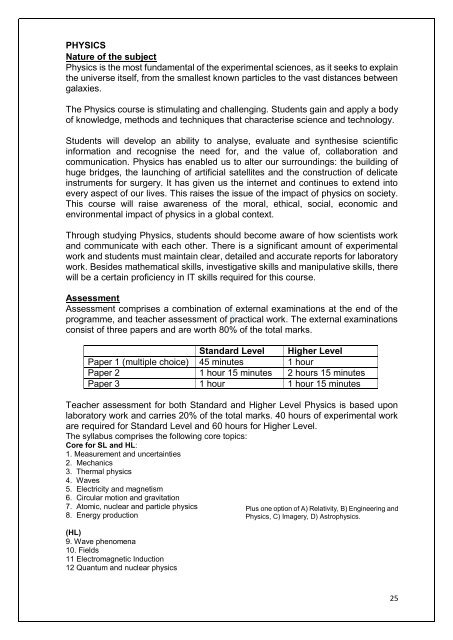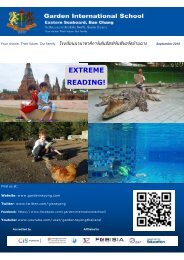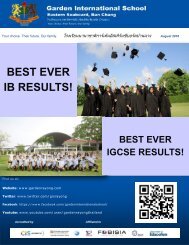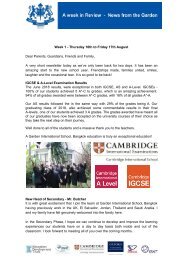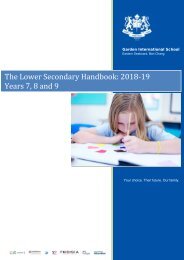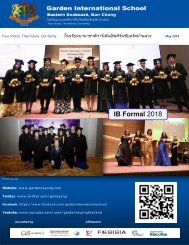GIS IB Handbook 2018-19
Create successful ePaper yourself
Turn your PDF publications into a flip-book with our unique Google optimized e-Paper software.
PHYSICS<br />
Nature of the subject<br />
Physics is the most fundamental of the experimental sciences, as it seeks to explain<br />
the universe itself, from the smallest known particles to the vast distances between<br />
galaxies.<br />
The Physics course is stimulating and challenging. Students gain and apply a body<br />
of knowledge, methods and techniques that characterise science and technology.<br />
Students will develop an ability to analyse, evaluate and synthesise scientific<br />
information and recognise the need for, and the value of, collaboration and<br />
communication. Physics has enabled us to alter our surroundings: the building of<br />
huge bridges, the launching of artificial satellites and the construction of delicate<br />
instruments for surgery. It has given us the internet and continues to extend into<br />
every aspect of our lives. This raises the issue of the impact of physics on society.<br />
This course will raise awareness of the moral, ethical, social, economic and<br />
environmental impact of physics in a global context.<br />
Through studying Physics, students should become aware of how scientists work<br />
and communicate with each other. There is a significant amount of experimental<br />
work and students must maintain clear, detailed and accurate reports for laboratory<br />
work. Besides mathematical skills, investigative skills and manipulative skills, there<br />
will be a certain proficiency in IT skills required for this course.<br />
Assessment<br />
Assessment comprises a combination of external examinations at the end of the<br />
programme, and teacher assessment of practical work. The external examinations<br />
consist of three papers and are worth 80% of the total marks.<br />
Standard Level Higher Level<br />
Paper 1 (multiple choice) 45 minutes 1 hour<br />
Paper 2 1 hour 15 minutes 2 hours 15 minutes<br />
Paper 3 1 hour 1 hour 15 minutes<br />
Teacher assessment for both Standard and Higher Level Physics is based upon<br />
laboratory work and carries 20% of the total marks. 40 hours of experimental work<br />
are required for Standard Level and 60 hours for Higher Level.<br />
The syllabus comprises the following core topics:<br />
Core for SL and HL:<br />
1. Measurement and uncertainties<br />
2. Mechanics<br />
3. Thermal physics<br />
4. Waves<br />
5. Electricity and magnetism<br />
6. Circular motion and gravitation<br />
7. Atomic, nuclear and particle physics<br />
8. Energy production<br />
(HL)<br />
9. Wave phenomena<br />
10. Fields<br />
11 Electromagnetic Induction<br />
12 Quantum and nuclear physics<br />
Plus one option of A) Relativity, B) Engineering and<br />
Physics, C) Imagery, D) Astrophysics.<br />
25


